- About Us
- Columns
- Letters
- Cartoons
- The Udder Limits
- Archives
- Ezy Reading Archive
- 2024 Cud Archives
- 2023 Cud Archives
- 2022 Cud Archives
- 2021 Cud Archives
- 2020 Cud Archives
- 2015-2019
- 2010-2014
- 2004-2009
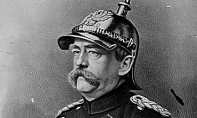 |
The Cud On History: The Rise Of The Prussian Empire And The Birth Of New Warfare |
In the period prior to 1914 the entire resources of the Prussian state were directed towards strengthening the territorial influence and supremacy of the greater nation — a "nation-in-arms". The Prussian army's considerable power (particularly after the victories of the 1870's)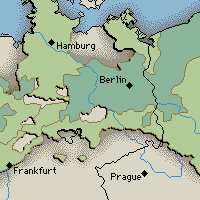 was the direct result of its ability to adapt and innovate militarily in areas of technology and strategy, and to find solutions to several of the administrative problems which were associated with the change taking place during the period.i Military success and Bismarckian diplomacy in Prussia also encouraged nationalism and patriotic fervor, and such forces were also critical in expanding the scope of popular support for increased militarism and state support of the army.ii Whilst initially none of the armed forces in Europe were able to keep pace with the developments of the Prussian army, by 1914 warfare was certainly a state versus state affair, and no longer confined to the smaller-scale, less mechanized Napoleonic-style conflicts of the professionals or privileged classes.
was the direct result of its ability to adapt and innovate militarily in areas of technology and strategy, and to find solutions to several of the administrative problems which were associated with the change taking place during the period.i Military success and Bismarckian diplomacy in Prussia also encouraged nationalism and patriotic fervor, and such forces were also critical in expanding the scope of popular support for increased militarism and state support of the army.ii Whilst initially none of the armed forces in Europe were able to keep pace with the developments of the Prussian army, by 1914 warfare was certainly a state versus state affair, and no longer confined to the smaller-scale, less mechanized Napoleonic-style conflicts of the professionals or privileged classes.
Particularly during the period from 1815 until 1860, a number of technological developments took place that Prussia was largely able to apply and take advantage of far more effectively than the other states of Europe. Britain and France, for instance, saw railways chiefly as a means of improving troop transportation, but it was Prussia, with its sprawling territories across Europe that was able to most benefit from the invention.iii By studying the experiences of France and Austria at war in 1859, and learning from its own mistakes in the war against Austria in 1866, by the time of the Franco-Prussian War in 1870 the 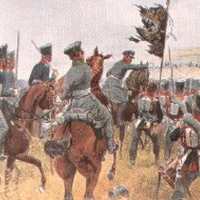 Prussian military administration had increased its use of railways to remarkable effectiveness. As Gooch supports, war was now no longer a remote affair; troops were more mobile, and arrived in good health to the battlefield — a stark contrast to the weary troops that emerged from long marches to battle.iv
Prussian military administration had increased its use of railways to remarkable effectiveness. As Gooch supports, war was now no longer a remote affair; troops were more mobile, and arrived in good health to the battlefield — a stark contrast to the weary troops that emerged from long marches to battle.iv
This era also saw rapid change in the realms of communication and weaponry. New innovations such as the electric telegraph brought the activities of the military more closely to communities and thus encouraged the growth of nationalist sentiments as communities' support for the army grew, whilst also increasing the literacy and political awareness of the masses.v Technological and scientific improvements in rifling, artillery, and high explosives were originally only slowly adapted by Prussia, but, once again, after her poor performance in the 1866 war against Austria, she set about on improvements.vi
With such radical improvements in the technology and mechanisms of warfare, statistical and especially administrative complexities and problems emerged which demanded solutions. Prussia's real strength lay in the existence of a permanent army corps, about 30,000 strong each, and localized in particular areas to draw men from.vii A complicated system of military service requirements kept the Prussian military far stronger than other armed forces in Europe. Service involved three years with the colors; four years with the reserve, and then was followed by entry into the landwehr. These corps were supplemented by the co-operating general staff.viii Whilst the old aristocratic officer corps of the Prussian army, 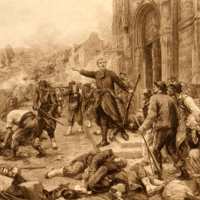 seeing itself as the defender of the monarchy and the social order, showed greater resistance to change than such states as France, the Habsburg Empire and Russia, it realized that it had to open itself up to increased specialization — the managerial, engineering and other technical skills of the middle classes — if Prussia was to be a dominant power in Europe.ix The result of such realism was that Prussia expanded its sphere of influence considerably in the nineteenth century, in a large part due to the effectiveness of the General Staff apparatus, set up by Moltke in 1857.x By 1914, with increased methods of equipping, training, and mobilizing troops, the Prussian army had risen in number to 3,400,000 (compared with 1,200,000 in 1870).xi The additional threat of a two-front war to Germany meant that the Prussian General Staff readied itself far more rapidly than other nations;xii thus administrative competence in Prussia certainly allowed her "mastery of rifle and railway" by 1914.xiii
seeing itself as the defender of the monarchy and the social order, showed greater resistance to change than such states as France, the Habsburg Empire and Russia, it realized that it had to open itself up to increased specialization — the managerial, engineering and other technical skills of the middle classes — if Prussia was to be a dominant power in Europe.ix The result of such realism was that Prussia expanded its sphere of influence considerably in the nineteenth century, in a large part due to the effectiveness of the General Staff apparatus, set up by Moltke in 1857.x By 1914, with increased methods of equipping, training, and mobilizing troops, the Prussian army had risen in number to 3,400,000 (compared with 1,200,000 in 1870).xi The additional threat of a two-front war to Germany meant that the Prussian General Staff readied itself far more rapidly than other nations;xii thus administrative competence in Prussia certainly allowed her "mastery of rifle and railway" by 1914.xiii
Above all, riding on the success of three major military victories in less than a decade, the nationalism that grew out of Prussian and Bismarckian triumphs encouraged the growth of nationalism.xiv Bismarck was able to draw on his spectacular victories and ride on a wave of nationalism to deflate his liberal opposition and allow for rapid militarism, and in effect Prussia was able to get away with a military dictatorship and a nominal parliament in a country with one of the largest middle-classes in Europe largely due to the attractiveness of staying on the "winning side".xv Nationalism transferred class grievances towards furthering the might of Prussia in Europe, thus eliminating upper class fears of upheaval caused by the opening up of the military, and encouraging the total state support and resource-support of Prussian/German military undertakings and activities.xvi After 1871, the Prussian institutions — conscription, strategic railways, mobilization techniques, and above all the general staff — were copied in every state in Europe.xvii
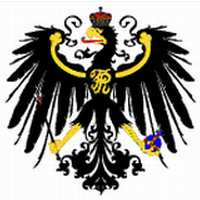 None of the other nations of Europe were able to reform their military to the same effectiveness as Prussia. The experiences of the 1870's taught Europe that the wars of the professionals were now well and truly over, and that Napoleonic standards were no longer any match for the German "nation-in-arms".xviii France, for instance, had always emphasized quality over quantity (which directly conflicted with the needs posed by the new war technologies), but it was opposition to the "blood tax" of conscription that most dramatically prevented any major military innovation. Even when, after the 1870's, some degree of conscription was introduced in France, and every Frenchman became acquainted with some degree of military life, the French military remained largely conservative and slow to adapt.xix Italy, similarly, whilst copying the Prussian model of increasing terms of military service, still lacked regional corps, and so mobilization of troops and corps unity was quite difficult.xx
None of the other nations of Europe were able to reform their military to the same effectiveness as Prussia. The experiences of the 1870's taught Europe that the wars of the professionals were now well and truly over, and that Napoleonic standards were no longer any match for the German "nation-in-arms".xviii France, for instance, had always emphasized quality over quantity (which directly conflicted with the needs posed by the new war technologies), but it was opposition to the "blood tax" of conscription that most dramatically prevented any major military innovation. Even when, after the 1870's, some degree of conscription was introduced in France, and every Frenchman became acquainted with some degree of military life, the French military remained largely conservative and slow to adapt.xix Italy, similarly, whilst copying the Prussian model of increasing terms of military service, still lacked regional corps, and so mobilization of troops and corps unity was quite difficult.xx
The Russian army of this era had experienced relatively few victories since 1815, and thus under War Minister Milyutin a number of badly needed reforms were implemented — however no general staff apparatus (as had been so successful in Prussia) was set up.xxi Whilst Russia remained a strong power, therefore, it was strong in numerical terms only, 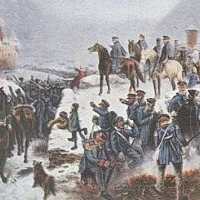 and not through any mastery of technology or new weaponry, and the "nation-of-arms" ideal could not be pushed very far because of fears of encouraging political unrest.xxii In Britain, finally, the terms of military service were actually reduced so as to encourage participation, but the possibility of introducing conscription was politically unthinkable.xxiii
and not through any mastery of technology or new weaponry, and the "nation-of-arms" ideal could not be pushed very far because of fears of encouraging political unrest.xxii In Britain, finally, the terms of military service were actually reduced so as to encourage participation, but the possibility of introducing conscription was politically unthinkable.xxiii
Clearly, after 1871 in particular, fear of provoking the mighty Prussian/German power remained a basic concern in all diplomacy into the twentieth century.xxiv Whilst all of the European nations attempted to duplicate the ingredients that had contributed to the rise of the German army to supremacy, none were able to satisfactorily adopt all of the elements with equivalent success. By the time of the outbreak of war in 1914, the rapid militarism of the late nineteenth and early twentieth centuries which had, in a large part, grown out of the threat of German dominance, had created a new style of warfare, in which the "Napoleonic" offensive strategies of the previous century were no longer possible due to the increased size of armies, and whereby there had been little effective pre-war planning to deal with the drastic scale of nation-in-arms warfare.xxv
Above all, the rise of the Prussian army to the position of being "a state within a state", borne out of her several victories, increased patriotic pride and fervor amongst the bourgeoisie and free citizens who became "perverted" by a sense of power, and extended their full support to the army — it was thus state supported.xxvi This new nationalism, large-scale national 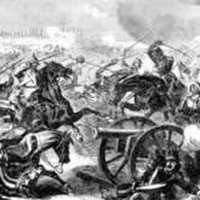 involvement and propagandist xenophobia spread across Europe, and mitigated against peace-talks during the war without any victory. Politicians throughout Europe, thinking there would be a short victory, surrendered their authority to their generals.xxvii As Howard states, World War One now made it clear that wars would be won by "...the side with the longest purse.... Armies were thus no longer the proxies or champions of nations at war. They were instruments through which the belligerents could bleed one another dry of resources and of men."xxviii Though the Prussian army was relatively unique in the late nineteenth century in terms of military strength and complete state support for the army, by 1914 her example and the ominous threat of her power had contributed to the development of a different and far more destructive style of warfare, and to the growth of the military institution in Europe to a size of immense proportions.
involvement and propagandist xenophobia spread across Europe, and mitigated against peace-talks during the war without any victory. Politicians throughout Europe, thinking there would be a short victory, surrendered their authority to their generals.xxvii As Howard states, World War One now made it clear that wars would be won by "...the side with the longest purse.... Armies were thus no longer the proxies or champions of nations at war. They were instruments through which the belligerents could bleed one another dry of resources and of men."xxviii Though the Prussian army was relatively unique in the late nineteenth century in terms of military strength and complete state support for the army, by 1914 her example and the ominous threat of her power had contributed to the development of a different and far more destructive style of warfare, and to the growth of the military institution in Europe to a size of immense proportions.
Endnotes
- Note Martin Kitchen, The German Officer Corps — 1890-1914, Clarendon Press, 1968, pp.1-21.
- Michael Howard, War in European History, Oxford University Press, 1993, p.110.
- Ibid., p.98.
- John Gooch, Armies in Europe, Routledge & Kegan Paul, 1980, p.68.
- Howard, op.cit., pp.98-99.
- Ibid., pp.102-104. The success of rapid industrialization in Prussia is discussed by Kitchen, op.cit., pp.xxi-xxii.
- Brian Bond, War and Society in Europe: 1870-1970, Leicester University Press, 1983, p.20.
- Ibid., p.20.
- Kitchen, op.cit., p.xxix.
- Howard, op.cit., p.99.
- Ibid., p.99.
- The 1905 Schlieffen Plan and comprehensive military legislation such as the Army Laws of 1912 support this. Ibid., pp.105.
- Gooch, op.cit., p.56. See also Karl Demeter, The German Officer Corps in Society and State, Weidenfeld and Nicolson, 1965, p.29.
- Ibid., p.114.
- Bond, op.cit., p.22.
- Social uprising caused by militarism and the opening-up of the armies in Europe in fact only occurred later at a significant level; in the Russian Revolution of 1917. Howard, op.cit., p.108.
- Ibid., p.101.
- Bond, op.cit., p.24.
- Ibid., p.23, p.35.
- Ibid., p.35.
- Kitchen, op.cit., p.65..
- Bond, op.cit., p.35, p.68.
- Ibid., p.38.
- Ibid., p.40.
- "There was a general acceptance of the inevitability of an armed conflict within the states-system... wars were no longer considered a matter for a group of a small feudal ruling class or group of professionals, but one for the people as a whole." Howard, op.cit., p.110. See also Bond, op,cit., pp.98-99.
- Bond, op.cit., p.63.
- Ibid., pp.98-99.
- Howard, op.cit., p.114.
